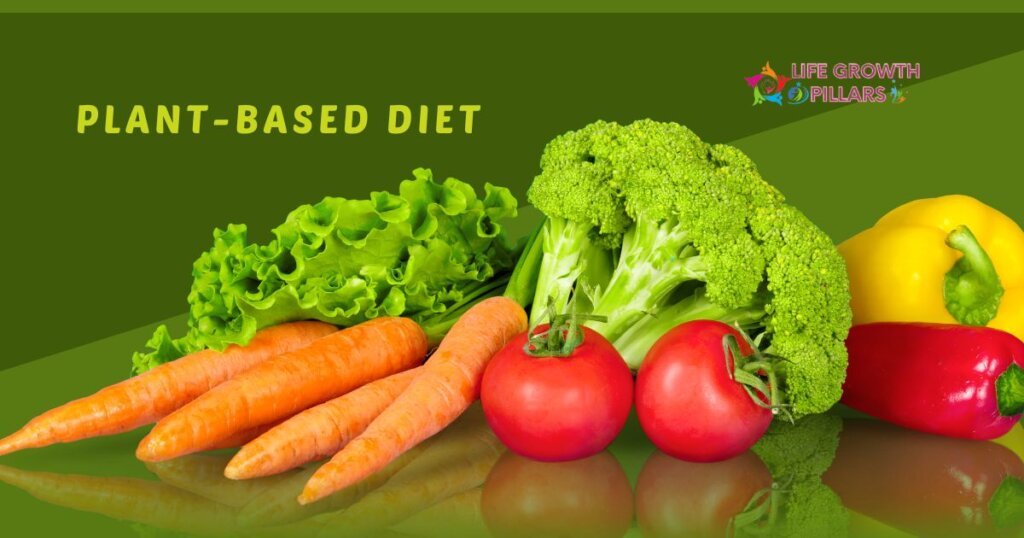Benefits Of A Plant-Based Diet | Nourish, Transform, Flourish
In a world where health and wellness are becoming increasingly vital, the benefits of a plant-based diet have garnered widespread attention. Embracing a plant-based lifestyle goes beyond personal health, it extends to environmental sustainability and animal welfare. This article explores the multifaceted advantages of adopting a plant-based diet, ranging from improved well-being to contributing to a greener planet.

20 Benefits Of A Plant-Based Diet
The benefits of a plant-based diet are expansive, covering physical health, environmental sustainability, and ethical considerations. By incorporating plant-powered goodness into daily life, individuals can experience a transformative journey towards overall well-being and contribute to a flourishing planet. Benefits of a plant-based diet encapsulates the essence of this enriching lifestyle, encouraging individuals to explore the numerous advantages it offers.
1. Enhanced Nutritional Intake
Switching to a plant-based diet introduces a plethora of essential nutrients. Fruits, vegetables, nuts, and legumes are rich sources of vitamins, minerals, and antioxidants crucial for optimal health. These nutrients not only nourish the body but also promote longevity and resilience against various illnesses.
2. Weight Management
One of the remarkable benefits of a plant-based diet is its effectiveness in weight management. Plant-based foods are generally lower in calories and saturated fats, making them an excellent choice for those looking to shed excess weight or maintain a healthy body mass index (BMI).
3. Heart Health Boost
Adopting a plant-based diet is a heart-smart decision. Research indicates that plant-based eating patterns are associated with a reduced risk of heart disease. The abundance of fiber, antioxidants, and healthy fats in plant-based foods contributes to lower cholesterol levels and improved cardiovascular health and consider one of the most important benefits of a plant-based diet.
4. Blood Sugar Regulation
For individuals concerned about blood sugar levels, a plant-based diet offers a natural solution. The complex carbohydrates found in plant foods, combined with fiber and essential nutrients, help stabilize blood sugar levels. Benefits of a plant-based diet for people with diabetes, this can help regulate blood sugar and manage symptoms.
5. Gut Health Improvement
benefits of a plant-based diet is a boon for gut health. The fiber present in fruits, vegetables, and whole grains promotes a healthy gut microbiome. A balanced and diverse microbiome is linked to improved digestion, enhanced nutrient absorption, and a lower risk of gastrointestinal issues.
6. Environmental Sustainability
Beyond personal health, embracing a plant-based diet contributes significantly to environmental sustainability. Raising animals for food is one of the biggest drivers of climate change, both through emissions and deforestation. By choosing plant-based alternatives, individuals actively participate in reducing their carbon footprint and supporting a more eco-friendly lifestyle.
7. Ethical Considerations
The shift to a plant-based diet aligns with ethical considerations surrounding animal welfare. Choosing plant-based options over animal products helps reduce the demand for factory farming and supports a more compassionate approach to food consumption and it is among the important benefits of a plant-based diet.
8. Increased Energy Levels
Many individuals report a surge in energy levels after transitioning to a plant-based diet. The abundance of vitamins, minerals, and antioxidants supports optimal bodily functions, leading to increased vitality and a sustained energy boost throughout the day.
9. Reduced Inflammation
Chronic inflammation is linked to various health issues, including autoimmune diseases and certain cancers. Plant-based foods, rich in anti-inflammatory properties, can help mitigate inflammation, providing a protective shield against chronic diseases.

10. Cognitive Benefits
Recent studies suggest a connection between plant-based diets and cognitive health. The antioxidants and anti-inflammatory compounds found in plant foods may contribute to improved brain function, reducing the risk of age-related cognitive decline.
11. Joint And Bone Health
Plant-based diets are rich in nutrients vital for maintaining strong bones and joints. Calcium, found abundantly in plant sources like kale, broccoli, and tofu, supports bone density. Additionally, the anti-inflammatory nature of plant foods may alleviate joint pain and reduce the risk of conditions like osteoporosis.
12. Balanced Hormones
Opting for a plant-based diet may positively influence hormone balance. The phytochemicals in plant foods can help regulate hormonal activity, contributing to a more stable endocrine system. This can be particularly beneficial for individuals facing hormonal imbalances or women experiencing menopausal symptoms.
13. Enhanced Athletic Performance
Benefits of a plant-based diet power is on the rise! More and more athletes and fitness enthusiasts are ditching animal products and embracing plant-based diets to fuel their workouts and crush their goals. The abundance of complex carbohydrates, vitamins, and minerals in plant foods provides sustained energy, quicker recovery, and improved endurance.
The vitamins and antioxidants present in fruits and vegetables play a crucial role in promoting radiant and healthy skin. These nutrients combat free radicals, which are known to accelerate aging and contribute to skin issues. By adopting a plant-based diet, individuals may experience a noticeable improvement in their complexion, reduced inflammation, and a natural glow.
15. Digestive Harmony
Plant-based diets are inherently rich in dietary fiber, promoting digestive harmony. Fiber aids in regular bowel movements, preventing constipation, and supporting a healthy gut microbiome. A well-functioning digestive system is foundational to overall well-being, and a plant-based diet contributes significantly to maintaining digestive health.
16. Budget-Friendly Nutrition
Contrary to the misconception that plant-based diets are expensive, they can be surprisingly budget-friendly. Staples like beans, lentils, rice, and seasonal vegetables are cost-effective and provide essential nutrients. Choosing plant-based options can be a practical and economical way to achieve optimal nutrition without breaking the bank.
17. Community And Social Impact
The choice to embrace the benefits of a plant-based diet extends beyond individual health to community and social impact. As more individuals adopt plant-based diets, there is a growing demand for sustainable and cruelty-free products. This shift in consumer behavior can influence businesses to prioritize ethical and environmentally friendly practices, creating a positive ripple effect in society.
18. Reduced Risk Of Certain Cancers
Scientific studies suggest that benefits of a plant-based diet may contribute to a reduced risk of certain types of cancers. The antioxidants and phytochemicals found in plant foods have protective properties that may inhibit the growth of cancer cells. While not a guaranteed prevention method, a plant-based diet can be a valuable component of a holistic approach to cancer risk reduction.
19. Supports Healthy Aging
Aging is a natural process, but the choices we make can influence how gracefully we age. The nutrient-dense nature of a plant-based diet supports healthy aging by providing the body with essential vitamins and minerals. The anti-inflammatory properties of plant foods also play a role in mitigating age-related conditions.
20. Versatility And Culinary Creativity
Exploring a plant-based diet opens up a world of culinary creativity and versatility in the kitchen. With a plethora of fruits, vegetables, grains, and plant-based proteins, individuals can experiment with diverse flavours and cooking techniques. This not only adds excitement to meals but also encourages a varied and nutrient-rich diet.

Conclusion
Embracing the benefits of a plant-based diet extends far beyond personal health. From enhancing nutritional intake to contributing to environmental sustainability and supporting ethical considerations, the advantages are both profound and diverse. By nourishing the body with plant-powered goodness, individuals can transform their well-being and, in doing so, contribute to a flourishing planet. So, why wait? Embark on your plant-based journey today and reap the countless rewards it offers for a healthier, happier life.
Frequently Asked Questions
Q1. Is a plant-based diet suitable for all ages?
A. Absolutely! A plant-based diet is suitable for individuals of all ages, from children to seniors. It provides essential nutrients necessary for growth, development, and maintaining optimal health throughout different life stages.
Q2. Can I get enough protein on a plant-based diet?
A. Certainly. While animal products are common protein sources, a plant-based diet offers ample protein through legumes, beans, tofu, tempeh, and plant-based protein supplements. With proper planning, it’s entirely possible to meet protein requirements on a plant-based diet.
Q3. Is it possible to build and maintain a healthy body on a plant-based diet without experiencing any nutrient deficiencies?
A. A well-balanced plant-based diet can provide all the essential nutrients your body needs. However, it’s essential to pay attention to certain nutrients like B12, iron, and omega-3 fatty acids, which may require supplementation or careful food choices.
Q4. Can a plant-based diet help with weight loss?
A. Yes, adopting a plant-based diet can contribute to weight loss. Plant-based foods are often lower in calories and saturated fats, making them a healthy choice for individuals looking to manage their weight. Additionally, the high fiber content promotes a feeling of fullness, aiding in weight management.
Q5. How can I make the transition to get the benefits of a plant-based diet?
A. Start gradually by incorporating more fruits, vegetables, whole grains, and plant-based proteins into your meals. Experiment with new recipes and meat alternatives. Seek guidance from nutrition professionals if needed, and listen to your body’s response as you make the transition.
Q6. Is a plant-based diet environmentally friendly?
A. Absolutely. Plant-based diets have a lower environmental impact compared to traditional animal-based diets. By choosing plant-based options, you actively contribute to reducing greenhouse gas emissions, preserving natural resources, and promoting sustainability.
Final Thoughts
Benefits of a plant-based diet journey is not just a dietary choice, it’s a holistic approach to well-being. The numerous benefits, from enhanced nutrition and weight management to environmental sustainability and ethical considerations, make a compelling case for embracing a plant-based lifestyle.
As we explore the benefits of a plant-based diet, it becomes evident that the advantages extend beyond personal health to impact the planet and future generations positively. Nourishing your body with plant-powered goodness isn’t merely a trend, it’s a transformative decision that holds the potential to flourish both your life and the world around you. So, whether you’re motivated by health goals, environmental concerns, or ethical considerations, the benefits of a plant-based diet are diverse, impactful, and accessible to all who choose to make this enriching lifestyle shift.



